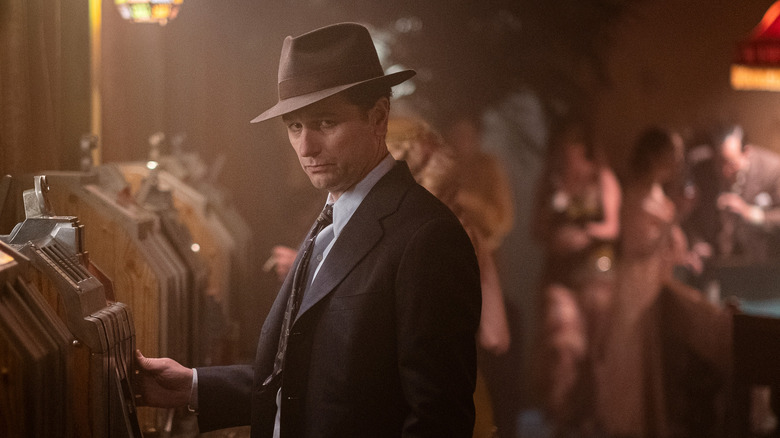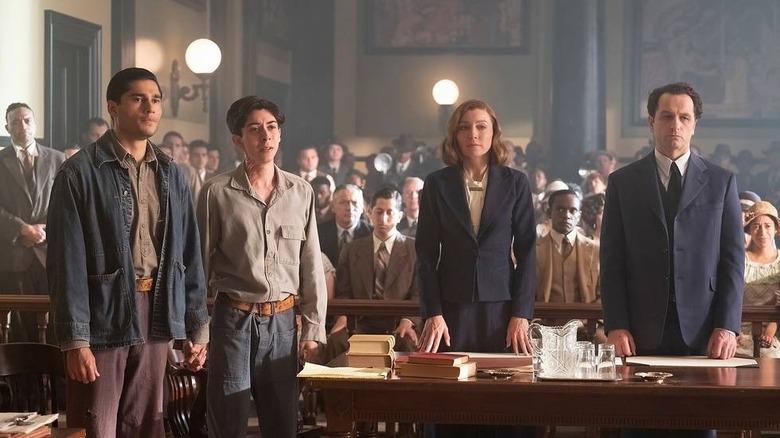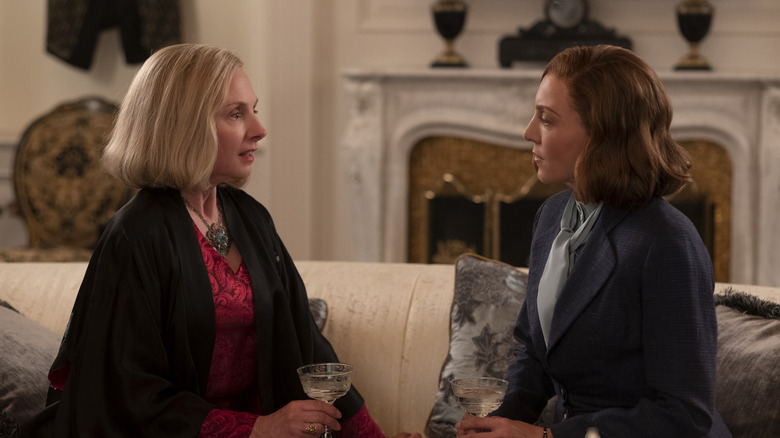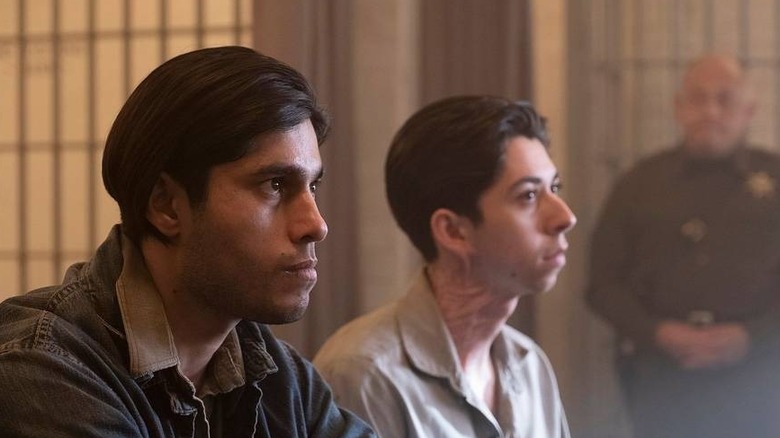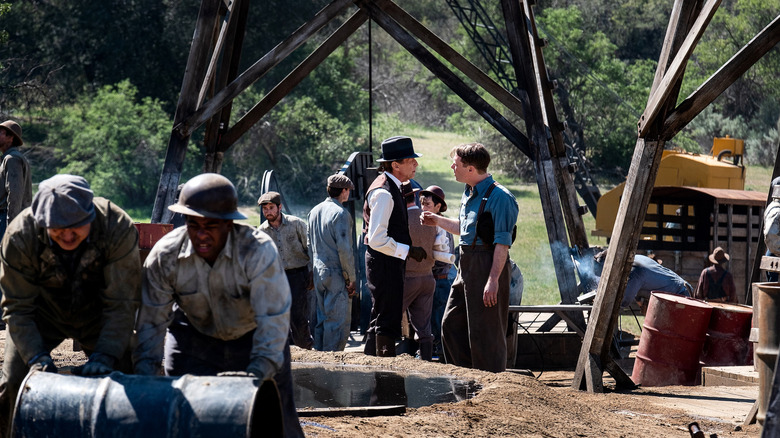Perry Mason Showrunner Breaks Down The Season 2 Finale [Exclusive Interview]
This post contains spoilers for the season 2 finale of "Perry Mason."
The second season of "Perry Mason" just ended with a definitive season finale, where the real person behind the murder of Brooks McCutcheon (Tommy Dewey) finds herself arrested by the F.B.I. The person in question, of course, is the oil magnate Camilla Nygaard (Hope Davis), who killed off her business partner's son because he threatened to expose her shady oil dealings with Japan.
We found this out at the end of the penultimate episode, and the finale opens on her getting her face stung by bees for beauty, and then resting on a bed covered in a horrific-looking facial mask. "Because we end on her in the last episode at the piano, we wanted to see the monster [at the beginning of the finale]," co-showrunner Michael Begler told me in an interview breaking down the last episode of the season. "We loved the juxtaposition that it's a beauty treatment that turns her into a monster."
I spoke with Begler about other major moments in the finale: Mason's jail sentence, the courtroom argument, who really pulled the trigger that fateful night, and what we might see in a potential third season. Read on for our full discussion.
Note: This interview has been lightly edited for clarity and brevity.
'We were going to take it all the way to the goal line -- we weren't going to reveal who did it until the end'
One of the things I thought was really interesting about the arc of the season is that the plot of the first seven episodes is a whodunnit, and then the eighth turns into a howcatchem, because you have a pretty good sense at the end of episode 7 who the real guilty party is. When you were breaking the story and developing the arcs for the characters, was that structure something that came organically, or is that something you just wanted to sort of play with from the get-go?
That's a hard question to answer because it took on so many different forms while we were doing the series. We initially started one way where we were going to take it all the way to the goal line — we weren't going to reveal who did it until the end. And then as we got into the season and as we were rewriting and moving the chess pieces around the board, it felt like this is where it needs to be, that we do want to give the audience what they need to know by the end of the seventh episode so it becomes more about our characters instead of, "Let's get through this plot point."
So now the focus is Perry, the character that we've seen with imposter syndrome all this season. He's now in a good place, really, and he's real driven by the end of the seventh episode. How is he now going to take everything that he has and turn it into something? Where does he go from here?
'It's like the characters on Succession — they live in a different universe than the rest of us, and they don't have the same POV'
The other thing I thought was interesting was the relationship between Perry and Strickland and how they are still friends even though Strickland betrayed him. How did you approach that relationship?
We just loved this love affair between these two men in terms of all the ups and downs — it's almost like a marriage. And that they're true men to the era. I really love the fight they have. I love how messy it is, that it's so sloppy, that they can't really emote. They can't really tell their feelings, but they understand each other. I think both these guys have been in the trenches in their own way, and I think that's why they relate so well together, but I think it's also why they butt heads.
Absolutely. Another moment I thought was great just in terms of character development was with Camilla. We progressively saw she was not a great person through the course of the season, but I love the scene between her and Phipps when he goes to get the negatives, and she's just the worst. When you were breaking the finale, was that a scene you wanted to throw in to confirm that she is the worst? What was the motivation to have that wrinkle in terms of that plot point?
It was to really show that this woman is self-motivated. She got where she got because she had to work so damn hard at it. She is a woman in the first part of the 20th century, and goddammit, nobody's going to get in her way. And if anybody does, she had to work even harder to get past that person. So now she's reached a place where you know she's not going to take s*** from anybody. I think she's lost perspective.
It's like the characters on "Succession" — they live in a different universe than the rest of us, and they don't have the same POV. When Camilla says, "Are you listening to Dr. Evans, the doctor I sent?" We actually used to have a moment where Phipps is on the phone with the doctor who's telling him just shove niacin down Constance's throat and he's like, "It's not working," and it's right before Perry comes in and he goes upstairs and she's throwing up. But Camilla thinks she knows better, and it's like, "You need to always listen to me because I've been right about everything so far."
I loved how the episode opens where Camilla's getting her undereyes stung by bees and we see her with the facial mask and she looks very alien. How did that cold open come about?
Oh my God, that's a long story. The short version is that, because we end on her in the last episode at the piano, we wanted to see the monster. We loved the juxtaposition that it's a beauty treatment that turns her into a monster. Then it was just doing some research, reading that venom therapy has been around since the time of the Egyptians and just the imagery of that. Again, the writers and I looked up imagery of all these photographs of beauty treatments from the era and those masks that they put on. It's just like, "How can we not do that? How do we not put that in?"
'He wants to take a look not just at the case, but the system'
Another thing I really thought this season did well is exploring themes about what justice actually is. I think the closing arguments of Perry and the District Attorney really touch on that. What was the process for breaking down those two speeches and how they contrasted with each other?
Well, I think with Milligan, the D.A., he wanted to look at the practicality of the case. He wanted to say, "It's right there in front of you." Again, you can draw all those parallels to the way people speak today. I think Perry hears what Milligan says and piggybacks off of it, but he wants to take a look not just at the case, but the system. I think that's what was really important. And I remember [Matthew Rhys, who plays Perry Mason] and I, we sat around for a while and really talked about what he would say in that moment, because it's not the end of the case, per se.
We're still in the middle of the episode. So it's not Perry's final moment. He knows he's buying time. But I think he's just trying to make this point of saying, "Let's be real here. We walk into every situation with a preconceived notion, and you have a preconceived notion of these two from the second you sit down here and you have to look at that, but you also have to look at the whole story of them. It's not black and white. These kids, Brooks took so much more from them. And that is what the tragedy of this is." I don't think Perry is condoning the fact that there's a person who pulled the trigger or that he hid the gun. I don't think he's condoning that. I think he's just saying that no situation is just as simplistic as Milligan is trying to lay it out to be.
I think it's interesting, too, when the deal is struck and we get the flashback about what happened. This is my personal interpretation, but I always assumed it was the younger brother who pulled the trigger just given what we've seen in the season, not the older brother as the "flashback" shows. Is that something you agree with?
Yeah, we wanted it to feel that in a sense that [the younger brother, Raphael] was a little more of the brains and also that he felt he was more motivated to do the murder — he's the one with the burn. He's the one who tried to save their sister and is scarred because of it. And he's the one right now who has the artistic talent, and all these things that are being held back from him. It's also his older brother taking care of him: "I'll go down for it. I won't let you pull the trigger. I need to pull the trigger."
'There are so many different sides to this city that aren't explored that had such a contribution to making L.A. what it is'
At the end of the season, the three core cast members have definitely gone through their own journeys and they have become more at terms with who they are and what they want to do. So I have to ask the question: If there is a potential third season, are there any themes you'd like to explore or character arcs or parts of Los Angeles history that you would love to tackle?
The answer is yes. There's a lot. Anything I have, I'm not allowed to talk about, because we don't have a third season yet. But I'll say this: I'm very lucky. This is a really amazing thing — so one of the historians, we had three amazing historians on the show, and it turns out that one of them, Bill Deverell, lives around the corner from me. He's such a wealth of knowledge and because he lives around the corner, we run into each other, we take walks, we've had a beer, we've had coffee, and he's told me so much that is unexpected.
This is what I loved about this season — this whole idea of oil and the wealth around it, you don't think about that when you think of L.A. You don't think about L.A. having a forest of oil derricks, right? The first thing that probably comes into people's minds when they think about L.A. in the '30s is something like Chinatown or just Hollywood in general, this sort of glamour. And you almost expect the stories to go that way. What I loved about this season and what I would want to do going forward is to keep playing with that expectation.
There are so many different sides to this city that aren't explored that had such a contribution to making L.A. what it is, and I think that's the great thing about this series. And yes, character arc-wise, there's so much there. Because again, we've just sort of launched them and now let's see where we take them.
The entire second season of "Perry Mason" is now streaming on HBO Max.
